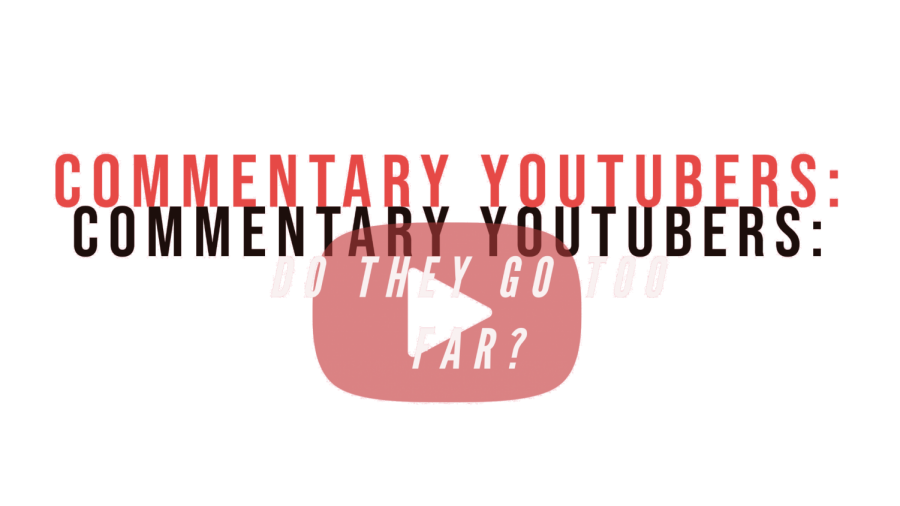Do commentary YouTube videos go too far?
YouTuber Danny Gonzalez recently came under fire for a commentary video he made about a local radio show.
April 13, 2020
YouTube has always been a platform for users to share their opinions and create content that can be consumed by the entire Internet. Recently, a genre of video called “commentary” has become incredibly popular on the site. Commentary videos revolve around content creators watching and providing their opinions on a piece of media, such as another YouTube video, a social media account or a TV show. Some popular creators even react to and comment on their old videos.
Although this genre is popular, it is not without controversy, especially among those that they criticize. Recently, one prominent YouTuber named Danny Gonzalez almost got into legal trouble regarding his videos. In this video, he reacted to and criticized a local radio show called “Waiting by the Phone,” where listeners call in to try and reconnect with people who ghosted them after a date. One of the show’s fans sent the video to the host over Twitter, and she responded by saying that Gonzalez should expect to get “slapped by legal” for using her face and voice on his channel. The only problem with the host’s statement is that her show falls under fair use laws, which means that as long as Gonzalez sufficiently altered the footage and added something to it (an entire commentary video, for example) he could not get into legal trouble with the radio show or its parent company, KIIS-FM. Gonzalez commented on this issue days after it occurred in another YouTube video, calling the host’s response “nasty” and “completely unsubstantiated.” But does the host have a right to be upset that her face and voice is being used for criticism, essentially making her a laughingstock to Gonzalez’s 3.5 million subscribers?
The short answer is yes. She can be as angry as she likes, but in reality, fair use protects any content creators from facing real consequences. However, with the rise of sites like YouTube where it becomes incredibly easy for anyone to upload anything without much backlash, a community has risen calling for a reevaluation of fair use laws regarding online platforms. Some commentary creators on YouTube can be very harsh to those they are critiquing, which can cause many problems when that creator’s fans go on to harass the critiqued person in question. There have been instances in which, after a famous creator reviewed a video or social media account, the user receives so much hate that they delete their account altogether. Many times, the user has not even done anything wrong, necessarily; Gonzalez’s video revolved around how “cringey” and “scripted” the show was, even going on to make fun of the hosts’ voices.
So, where do we draw the line? These creators have a right to use people’s content however they like under fair use, even if it is for harsh criticism and a quick laugh for viewers. Movie and music critics are never attacked for having an opinion on a piece of art; it is their job to critique it and share their opinion. Should we treat these YouTube commentary creators any differently? Some may say no, but the truth is that these creators could potentially be truly harming people’s lives. They are not professional critics that get paid to give their opinion—those people are trained in their field and have a college degree or some other credentials that makes them qualified to critique people’s work. Commentary creators typically don’t have any of these things, and worse, they have armies of fans behind them willing to go to war based on their idol’s opinion. Although these creators are technically protected under fair use laws, rather than using others’ content to make their own mediocre videos, they should try to be more creative and engaging rather than bullying others in order to rise to fame.










Samantha Hauke • Aug 23, 2021 at 11:10 pm
i’m not so sure u even watched danny gonzalez’s video. the claims that he “harshly criticized” and “bullied” the host are outrageous. laura and babs made amazing arguments against ur article, and i don’t think i need to further add onto their already great comments
Babs • Jul 11, 2020 at 10:54 pm
Pretty much all comedy has someone become the butt of the joke. for example, in Looney Tunes Bugs Bunny mocks Elmer Fudd, and many jokes in episodes where he appears they mock his lisp and weight. Even something as innocent as Looney Tunes contains someone/ a group of people being mocked.
———
“Some may say no, but the truth is that these creators could potentially be truly harming people’s lives. They are not professional critics that get paid to give their opinion—those people are trained in their field and have a college degree or some other credentials that makes them qualified to critique people’s work.”
1. In the case of Angie (the woman Danny mocked) she ruined herself, she made empty legal threats and behaved like a child over some total stranger making fun of her show. Angie conducted herself very poorly and that’s totally on her, we shouldn’t defend a 40+ year old woman taunting people trying to politely explain fair use.
2. What degree is there to be a comedian and make fun of people?? You’d probably trust someone with a degree more if they were attempting to make constructive criticism and were critiquing them on their show. But that’s not what Danny’s doing, nor has he ever claimed to do that. He was making jokes and poking fun, nothing more and nothing less.
3. It takes a hell of a lot to ruin someone’s life. Someone pointing out that a very successful but clearly staged radio show should not be considered ‘life ruining’. Hosts Fred and Angie still have their jobs and are still popular. your point doesn’t make sense, you don’t site any sort of example on how a commentary youtuber has ruined an innocent person’s life.
———
“they should try to be more creative and engaging rather than bullying others in order to rise to fame.”
1. I’d argue it takes creativity to make actually funny jokes for 15 minutes, and making fun of people isn’t all he does. That’s a huge generalization about people in the commentary genre. And people have made careers out of solely mocking people for a long time, people have roasted professionally since forever.
“even going on to make fun of the hosts’ voices.”
1. He didn’t make fun of their voices, he made fun of their behavior.
———
It seems you have some sort of weird bias against him. most people watching those two videos can clearly see he didn’t have any sort of ill will towards them.
Laura • Jul 3, 2020 at 2:07 pm
The funniest thing here is that, he’s not bullying her like you’re implying. And his followers didn’t harass her. First of all, bullying implies a power dynamic where the person doing the insulting and making cruel remarks is more powerful or has some advantage over the insultee. Gonzalez is just some dude with a couple million followers on youtube. She’s an experienced radio show host who saw a screenshot of his video minutes after it was posted, didn’t watch it, and immediately threatened legal action. Also, as I said before, his followers DIDN’T harass her. She started the argument with no prompting, and when people started trying to explain to her that the video falls under fair use and is legal, she got more and more threatening and aggressive. She even heavily implied some threats towards a user who mentioned she also works in radio and saw no legal avenue to get Gonzalez “slapped by legal”. Criticism is part of fair use and of free speech. Implying that regulations on it should be tightened is making room for arguments that criticizing even people in power shouldn’t be okay and that can lead to some dangerous places. Sure, people can be mean when they’re criticizing media. But get this, it’s okay. No one needs a bachelor’s degree in “criticizing stuff” to have strong opinions about things. And if you’re going to be a public figure, there’s always gonna be people who don’t like you. If you can’t handle that, then you need to rethink your career. You can’t just say “anyone who disagrees with me or points out my flaws is a bully and should be silenced” and expect it to be okay. This leads, again, right to fascism, friend. Figure yourself out and broaden your understanding of the world before you make these kinds of claims.